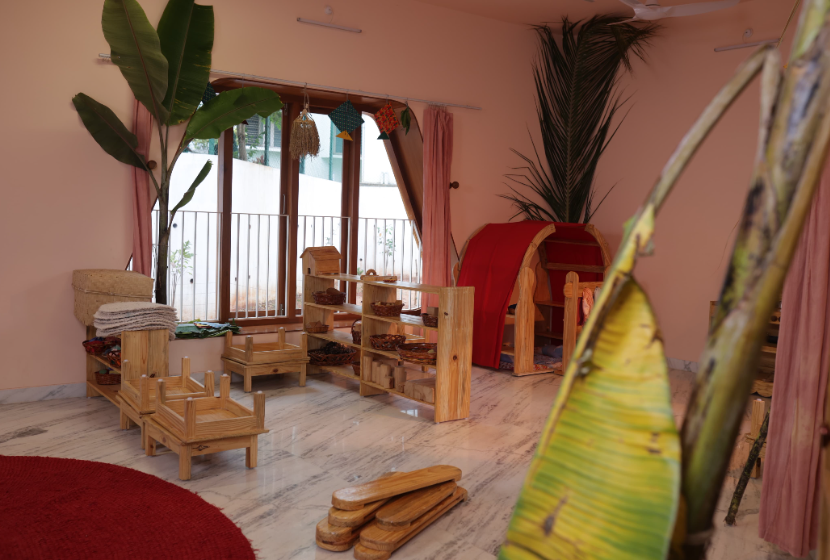How the School Environment Preserves Early Years | Kindergarten in Vizag
Table Of Contents
- The Architecture of Belonging
- Rhythm: The Invisible Teacher
- Play as Sacred Work
- The Presence of the Teacher
- Nature as the Second Classroom
- The Long View of Learning
- In Conclusion: A Place to Be Little
In the rush to prepare children for the world, we often forget to prepare the world for children.
At Swechha, a Waldorf school in Vizag, we believe the early years are not a holding period before ‘real’ learning begins. They are the very heart of it. A time when the world is met with wide eyes, curious hands, and an open soul. A time not to be hurried through, but held, gently, deliberately, with love.
But how does a school environment preserve something so tender and, so precious? How do we, as educators and caregivers,create a space where early childhood education is not trimmed down for efficiency but allowed to blossom fully.
The answer lies in the environment as ethos—a living, breathing space that mirrors the rhythms of nature, the warmth of home, and the sacredness of being little.
The Architecture of Belonging
Walk into a Waldorf-inspired preschool in Vizag, and you’ll feel a sense of belonging.
There are no glaring colours or overstimulating posters. Instead, the space is softened with natural wood, warm colors, and textures that invite touch. The light streams in through large windows, connecting the indoors to the outdoors. Toys are handmade, often from wool, cotton, or wood designed not to entertain, but to inspire imagination.
At Swechha Waldorf Inspired School in Vizag, we’ve crafted our spaces with the belief that beauty is not a luxury, it is nourishment. When children feel that their environment is thoughtful and calm, they begin to carry that stillness within themselves. They learn that the world is gentle, trustworthy, and full of wonder.
Rhythm: The Invisible Teacher
Preserving early years education is not just about protecting innocence. It’s about offering rhythm.
Each day at Swechha in Visakhapatnam follows a gentle, predictable flow: circle time, story time, outdoor play, shared meals, handwork. This rhythm is not rigid structure, it’s soulful consistency. It gives children the safety to explore, the freedom to play, and the confidence to rest.
Unlike hurried schedules that chop the day into cognitive blocks, Waldorf rhythm nurtures the whole being—body, heart, and mind. A child does not ask, “What’s next?” in anxiety, but leans into each moment, knowing it will carry them where they need to go.
Play as Sacred Work
In many schools, play is the reward after “real” work. At Swechha, play is the work of childhood.
But this is not idle play. It is deeply intentional. When a child builds a home from blocks or stirs an imaginary pot, they are not wasting time. They are developing language, spatial awareness, empathy, and storytelling. They are learning how to live.
This is what sets Swechha apart among the best kindergarten schools in Vizag—our understanding that play is not downtime. It is foundational, formative, and full of possibility.
The Presence of the Teacher
Our teachers are not instructors delivering content, they are caretakers of wonder.
They speak softly. They move intentionally. They observe more than they direct. They use music instead of instructions. In doing so, they create a mood that is safe, warm, and quietly reverent. The teacher’s inner life—calm, centered, joyful—becomes the emotional weather of the classroom.
At Swechha, the teacher’s presence is not overpowering, but empowering. Like a gardener tending a sprout, they know that growth cannot be forced, but it can be lovingly held.
Nature as the Second Classroom
Preserving early years also means placing children where they belong, in nature.
Every day, Swechha’s kindergarteners step outside. They touch soil, gather leaves, and listen to birds. Rainy days are for puddles. Windy days are for kites. Nature becomes a teacher, a playground, and a balm.
In a world increasingly digital and disconnected, nature keeps the child anchored. It teaches patience, awe, and cycles. And most importantly, it reminds children they are not apart from the world, they are a part of it.
The Long View of Learning
Many parents ask: Will my child be “ready” after kindergarten?
At Swechha, we gently reframe that question. Ready for what?
For a test? Perhaps not. For a life of curiosity, compassion, and confidence? Absolutely.
Our environment doesn’t rush children into academics. It readies them to meet learning with joy when the time is right. Emotional readiness, motor development, and imaginative richness are the true foundations. When these are strong, academic skills follow, not as pressure, but as pleasure.
Swechha: A Place to Be
In a society that often wants to raise children up fast, Swechha chooses to let them stay little, just a while longer. Not out of fear, but out of wisdom. Because we know that the child who has been deeply seen, gently held, and freely expressed in their early years… is the adult who will live with depth, dignity, and direction.
If you are looking for a kindergarten in Vizag that honours the early years not as preparation, but as purpose, Swechha welcomes you.
Here, we don’t rush childhood.
We preserve it.
We protect it.
We celebrate it.
Because childhood, once lost to the clock, can never be reclaimed.
